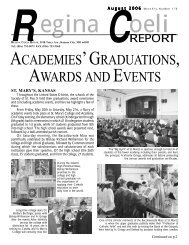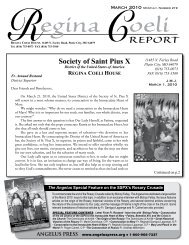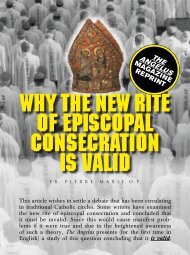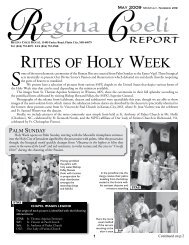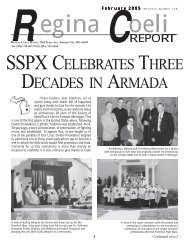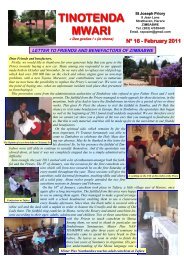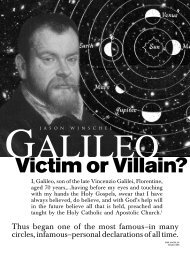Is Feeneyism Catholic? - Society of St. Pius X
Is Feeneyism Catholic? - Society of St. Pius X
Is Feeneyism Catholic? - Society of St. Pius X
Create successful ePaper yourself
Turn your PDF publications into a flip-book with our unique Google optimized e-Paper software.
36 IS F EENEYISM C ATHOLIC?<br />
Lord mentioning the water as the obligatory means (necessary “re<br />
aut voto–in fact or in desire”) to obtain that spiritual rebirth. Contrary<br />
to what the followers <strong>of</strong> Fr. Feeney pretend, the emphasis <strong>of</strong><br />
this whole passage is not on water, but on rebirth. By holding<br />
with the Church that the rebirth is what is absolutely necessary,<br />
and that water is necessary “re aut voto,” one respects the truth <strong>of</strong><br />
the words <strong>of</strong> Our Lord and the truth <strong>of</strong> the interpretation <strong>of</strong> the<br />
Church. By pretending that water itself is absolutely necessary<br />
without any exception whatsoever, one departs from the interpretation<br />
<strong>of</strong> the Church, thereby being unfaithful to Our Lord Himself.<br />
IS JOHN 3:5 A LAW?<br />
Bro. Robert Mary objects thus: “It is not totally correct to say<br />
that the above quote from Our Lord is a law. A law, strictly speaking,<br />
is a command or a prohibition. The words <strong>of</strong> Our Lord [...]<br />
are given by <strong>St</strong>. John in the form <strong>of</strong> a proposition, a statement <strong>of</strong><br />
fact. It is either true or it is false. [...] God is not bound by the laws<br />
He has set. However, God is bound by the propositions He has<br />
made. [...] If God is not bound by water in terms <strong>of</strong> salvation,<br />
then we may ask, why bind Him to His word in any <strong>of</strong> His teachings?”<br />
(op. cit., p.99).<br />
His reasoning falsely presupposes that baptism <strong>of</strong> blood and<br />
baptism <strong>of</strong> desire would make Our Lord’s proposition false. This<br />
objection had been answered many times by the best theologians<br />
(e.g., <strong>St</strong>. Thomas quoted above) unanimously. For instance Billuart<br />
44 : “He who said generally, unless one is reborn, etc., has said<br />
with no less generality: everyone who believes in him shall not be<br />
confounded, 45 whosoever shall invoke the name <strong>of</strong> the Lord shall<br />
be saved, 46 he who loves Me shall be loved by My Father, 47 and<br />
other similar statements. Hence the Church rightly understands<br />
this general sentence <strong>of</strong> Christ unless one is reborn <strong>of</strong> baptism <strong>of</strong><br />
water in re vel in voto–in fact or in desire.” Thus the proposition <strong>of</strong><br />
44 Summa Sancti Thomae, III, p.233 (Part VI, Ch.1, A.6; he has 12 pages on<br />
baptism <strong>of</strong> desire).<br />
45 Rom. 9:33, 10:11, quoting <strong>Is</strong>. 28:16.<br />
46 <strong>St</strong>. Peter in Acts 2:21, <strong>St</strong>. Paul Rom. 10:13, both quoting Joel 2:32.<br />
47 Jn. 14:21; for other texts, see for instance Jn. 11:26.



